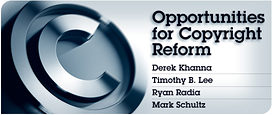There’s much I agree with in Ryan Radia’s latest missive. Ryan endorses reforms to the asset seizure provisions of the PRO-IP Act and the anti-circumvention provisions of the DMCA, and he shares my view that Congress should address the orphan works problem.
But I think Ryan paints a misleading picture of a balanced debate over copyright policy. It’s true, of course, that one side wants stronger copyright protection while the other side wants protections to be weaker—that’s how political debates tend to work. But Ryan fails to acknowledge just how lopsided the debate over copyright has been in recent decades. In the 80s, 90s, and 00s, Congress routinely passed bills extending copyright terms, increasing the penalties for infringement, and expanding copyright enforcement. Congress passed more than a dozen copyright bills between 1976 and 2008. Every single one of them made the copyright system friendlier to copyright holders.
Ryan complains that my previous piece “makes no mention of reforms that would enhance the enforcement of copyrights.” But that’s largely because there aren’t very many “enhancements” left to try. The reason Hollywood overreached in such a grotesque fashion with the Stop Online Piracy Act is that by 2011 Congress had already enacted all the less draconian ideas on the industry’s wishlist. Congress had already ratcheted up the penalties for enforcement (several times), banned the circumvention of DRM schemes, criminalized camcording in movie theaters, created an IP enforcement czar, given the government the power to seize infringing websites, and much more. If more enforcement powers were the key to stopping infringement, they would have done the trick by now.
I don’t agree with Ryan’s suggestion that the DMCA’s notice-and-takedown regime needs to be overhauled to make it more friendly to copyright holders. Doug Lichtman and Eric Posner argue that the law gives intermediaries insufficient incentive to take active steps to combat infringement, yet many intermediaries have done just that. YouTube has developed the ContentID system to automatically filter out (or allow rights-holders to automatically monetize) infringing uploads. Major broadband ISPs have signed onto a “graduated response” regime that will penalize repeat infringers.
That’s not to say there isn’t room for compromise. I don’t have an objection, in principle, to a legal process for cutting off the revenue streams of overseas sites dedicated to infringement. But given how far Congress has tilted the copyright system in Hollywood’s favor of the last four decades, it’s absurd to suggest that we should start by making the system even more friendly to large copyright holders.
Rather, as Derek Khanna and others have argued, the most urgent items on the copyright reform agenda are all in the opposite direction: shorter terms, asset seizure reform, fixing the orphan works problem, liberalizing the DMCA’s anti-circumvention rule, reducing draconian “statutory damages,” and so forth. Congress may be too beholden to major content companies to enact any of these reforms in the near future. But at least reformers now seem sufficiently well-organized to stop bills that would tilt the system even more in Hollywood’s favor.

